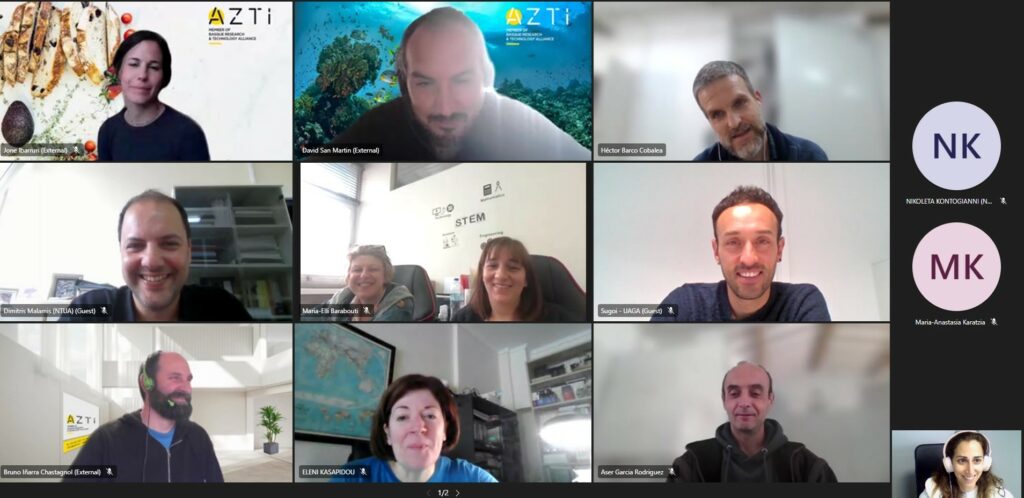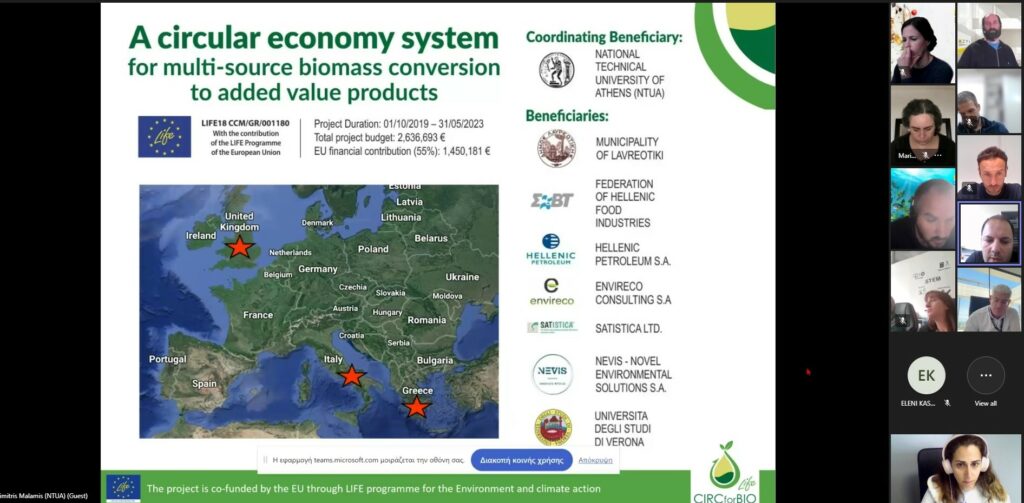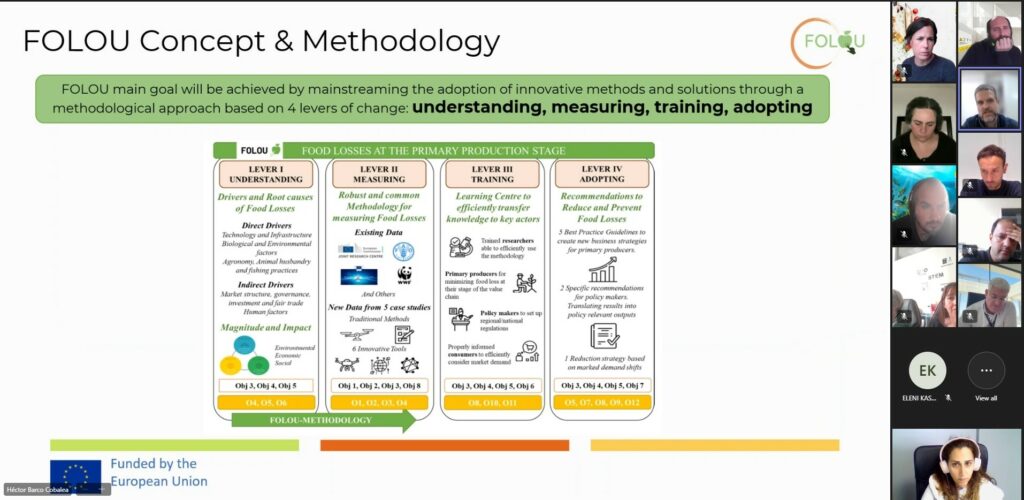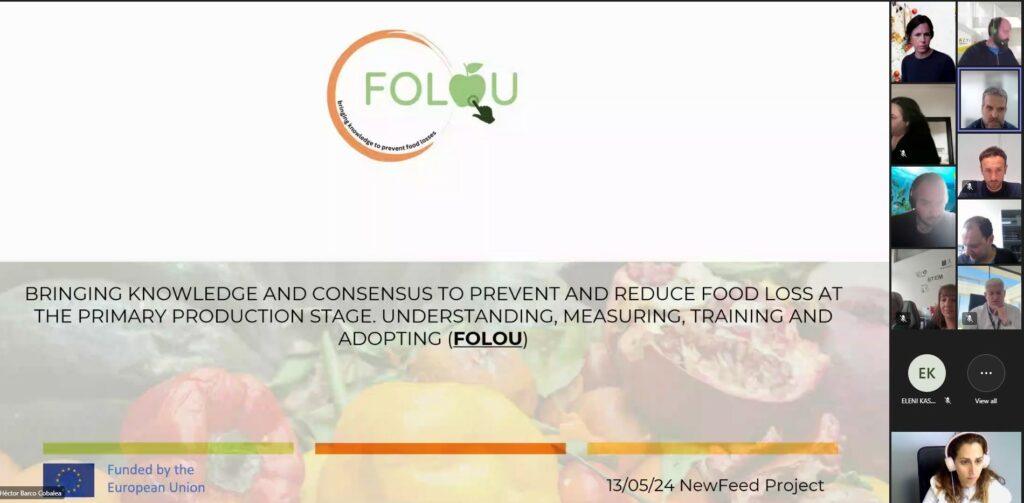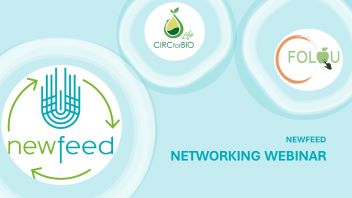
Networking Webinar Highlights: Engaging with CIRCforBIO and FOLOU Projects
On May 13th, NEWFEED organized an engaging networking webinar, bringing together key representatives from the CIRCforBIO and FOLOU projects. This event aimed to foster discussions on innovative approaches in the valorization of organic waste, food loss, and food waste between representatives of similar EU-funded projects. The webinar featured insightful presentations from David San Martin (NEWFEED), Dimitris Malamis (CIRCforBIO), and Hector Barco Cobalea (FOLOU), followed by interactive Q&A sessions.
The webinar kicked off with David San Martin, the coordinator of the NEWFEED project, welcoming the audience and representatives of the two “similar” projects. David provided an overview of the NEWFEED project and outlined its objectives, focusing on developing alternative animal feeds based on circular economy principles by converting food by-products into high-value feed.
CIRCforBIO Project
Following the NEWFEED presentation, Dr. Dimitris Malamis presented the LIFE CIRCforBIO project, which started in 2019. He outlined its objectives and methodologies in valorizing organic waste. The project, led by the National Technical University of Athens (NTUA) and the University of Verona, aims to reduce greenhouse gas emissions (GHG) mainly by replacing fossil fuels, that it is, fuels derived from biomass (any organic source). Its objectives are to substitute fossil fuels with advanced biofuels, thereby reducing greenhouse gas emissions, and to promote a circular economy by valorizing waste biomass from multiple sectors. The project utilizes municipal organic biomass, industrial biomass sources, and different waste streams to produce bioethanol, bio-oil, biogas, and bio-fertilizer through processes like thermal drying, oil extraction, bioconversion, and anaerobic digestion. The demonstration plant, with a capacity to handle one ton of waste biomass per day, has shown high potential in producing valuable biofuels, collaborating with Hellenic Petroleum and other companies. Additionally, the CIRCforBIO platform connects stakeholders—biomass producers, technology providers, plant owners, and experts—to facilitate information exchange and boost waste biomass valorization, promoting a circular economy on a larger scale. For more information, stakeholders can visit the CIRCforBIO platform and follow the project on social media.
FOLOU Project
Hector Barco Cobalea from the FOLOU project (Horizon 2020) shed light on their efforts to tackle food loss and waste. Hector discussed the project’s research and practical applications aimed at reducing waste and promoting sustainable practices. This project, involving a consortium of 15 beneficiaries from eight countries, aims to bring knowledge and consensus on preventing food loss, which poses significant economic, environmental, and social challenges. The EU Commission’s 2019 decision mandates measuring food waste across the entire food chain, excluding primary production, due to its complexity. FOLOU’s main objectives are to measure, monitor, report, and assess the magnitude and impact of food losses through a structured roadmap: understanding the problem, measuring it, training key actors, and providing recommendations to reduce and prevent food losses. Barco emphasized the importance of defining food loss distinctly from food waste and introduced key documents, including the FOLOU Definitional Framework and Quantification Manual, which guide the measurement and reporting processes. The project is validating its approaches through external reviews, case studies on various commodities like fruits, vegetables, maize, potatoes, milk, salmon, and mussels, and the use of innovative technologies like drones. This extensive validation will inform a comprehensive quantification manual to be published in 2026, providing guidelines for both territorial and farm-level food loss measurement. For more information, stakeholders can attend upcoming webinars and engage with the FOLOU project directly.
Interactive Q&A Sessions
The webinar concluded with interactive Q&A sessions, allowing participants to engage directly with the speakers. The discussions among the participants were mostly related to the feasibility of using municipal food waste as animal feed, the regulatory challenges, the need for efficient processing technologies, the importance of maintaining nutritional composition and stability in feed ingredients, regulatory flexibility, and the potential economic and sustainability benefits for industries collaborating with NEWFEED.
Final Thoughts
The webinar provided a valuable platform for sharing knowledge and fostering collaboration between the NEWFEED, CIRCforBIO, and FOLOU projects. The discussions underscored the critical role of innovation in addressing food waste and promoting sustainability in the livestock sector. David San Martin highlighted the importance of the work done by both projects and recognized common challenges faced in implementing solutions at scale and across different regions. He emphasized the need to transition from development to real-scale implementation and to facilitate knowledge sharing among regions working towards similar goals.
Finally, the webinar closed with an emphasis on the need for clarity and standardization in defining and quantifying food loss, and a commitment to continued collaboration and knowledge sharing among the projects.
For more information on the projects networking activities read here.
